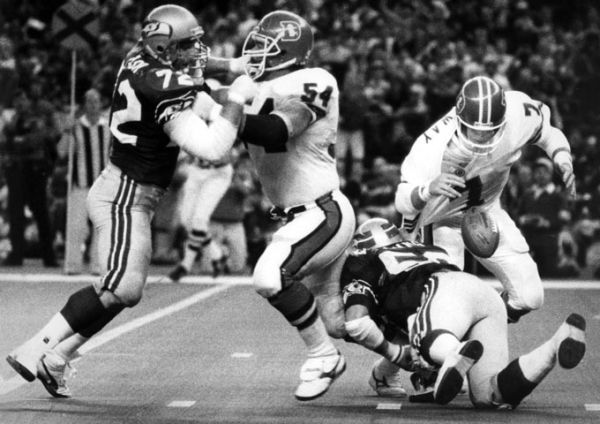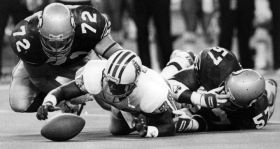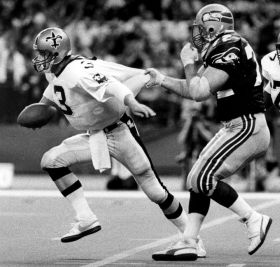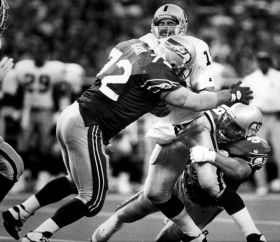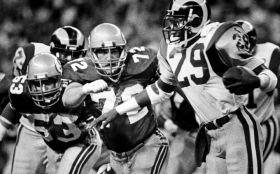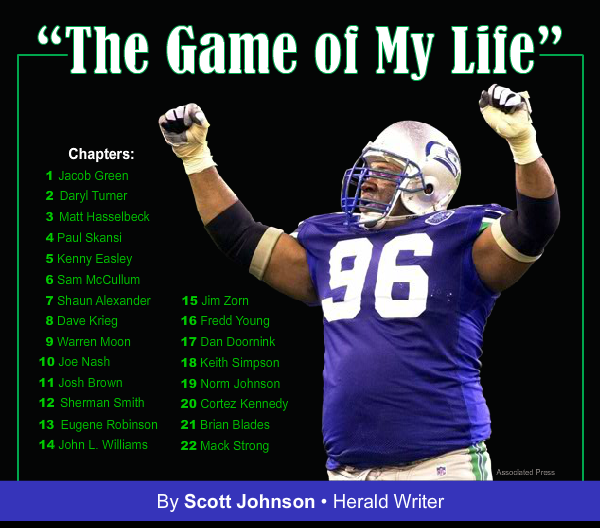[ The Herald ]
Joe Nash learned the importance of teamwork at an early age. He was born into a family that already had eight kids, and the Nashes eventually added four more. With 12 siblings, Joe Nash was part of a team throughout his entire childhood.
"In large families," he said, "you've got to be a team player."
That philosophy would be the key to a career that went on longer than anyone – even Nash himself – could possibly expect.
Nash was the kind of player who didn't put up big statistics or earn many awards. He was, quite simply, the kind of player that got the most out of his ability and made everyone around him better. And that was more than enough to keep him in the NFL for 15 productive seasons, a record of longevity among Seahawks.
"You could always count on Joe," said former Seahawks coach Chuck Knox. "He anchored that line for a long time."
Joe Nash was a pillar on the Seahawks' defensive line for a decade and a half. And yet the most important play of his career came not as a defensive player but as a member of the Seahawks' special teams unit. He was always willing to do whatever it took, whether that meant freeing up a teammate for a sack or getting his mitts on an opponent's kick.
Nash did it all, because that's what being a team player was all about.
When Joseph Andrew Nash was one of the leaders of the Boston College High School football team, no one would have taken him for a future NFL prospect. He was a 195-pound senior who played both offensive and defensive line, and so even a college career seemed out of his reach. Nearby Boston College was one of the few schools to offer a scholarship to the undersized overachiever, and he quickly worked his way into the starting lineup. After bulking up to a svelte 205 pounds, he started as a freshman for the Golden Eagles. He eventually got up to 250, starting all four years he was there.
Nash's lack of size kept him from getting selected in the 1982 NFL draft, and so he had to settle for signing a free-agent contract with the Seahawks. When he showed up for the first week of training camp, there were more than 100 other rookies and free agents there, all hoping to make the team. And the veterans hadn't even arrived yet.
"The field was full of guys," he remembered. "There were two and three lines at every position. This was before they had roster limits. You felt like a number."
But soon the Seahawks would learn Nash's name. They liked his effort and saw some potential. They just didn't have a roster spot available. And so he got cut.
"I thought: Well, I gave it a great shot. At least it was a great experience," he said of his career as a professional football player. "I was just a rookie, fresh out of college, so I would have just found something else to do."
But as Nash stood in line with the other final cuts, waiting to turn in his playbook, Director of Pro Scouting Chuck Allen motioned for him to step into his office. Allen told Nash that the team was planning to put one of its veterans on injured reserve the following day – a technicality that would prevent that player from having to clear waivers when he got healthy – and re-sign the rookie from BC. Nash, improbably, had made the team.
Still undersized at 255 pounds, Nash signed a contract that would pay him $40,000. When the 1982 season was cut short because of a players' strike, Nash couldn't pay rent and had to move back in with his parents in their Boston-area home. Even when the strike was lifted, Nash still found playing time hard to come by. His big break didn't come until eight games into the 1983 season, when veteran Manu Tuiasosopo suffered an injury known as turf toe. With Tuiasosopo sidelined, the undrafted rookie stepped into the starting lineup and stayed for a long, long time. He started 51 consecutive games before an injury temporarily sidelined him at the end of the 1986 season. He finished his career with 169 starts, the third-highest total in franchise history.
Nash played in plenty of memorable games during a 15-year NFL career that ended in 1996. But his favorite came during his Pro Bowl season in 1984, his second year as a Seahawks starter. The game, naturally, came against the Los Angeles Raiders. They were Seattle's biggest rival during Nash's tenure, and the Seahawks were coming off a season in which they swept the Raiders in the regular season before losing to them in the AFC championship game.
Nash had a big hand – literally – in the second game of that series during that 1984 season.
Seahawks vs. Los Angeles RaidersNovember 12, 1984
as told by Joe NashIt was at the peak of the rivalry. We beat them twice the year before, and then they beat us in the AFC Championship game and then went on to win the Super Bowl.
We lost to them in a month earlier in L.A., but the game at the Kingdome was a fight. Anytime we played them, it was always a battle -- especially at the Kingdome, where the fans were really into it.
The fans at that time had those Raider Buster shirts. I think they sold like thirty- to forty-thousand of them. It was "Monday Night Football," back when the Raiders were supposed to be unbeatable on "Monday Night Football." But we had a pretty good record too, having won four of five times on Monday nights.
We were fired up for the game. It was Raider Week; that's what we called it. As soon as the game was over the week before, that's all we thought about the rest of the week. Everything was about Raider Week. I'm not sure if they felt the same way, but for us that was the biggest game of the year – every year.
I went against Dave Dalby and Mickey Marvin, two of the Raiders' offensive linemen, that game. Dalby was an old vet. He knew all the tricks. He was kind of knocking me around a little bit early on. He probably got the better of me. I was playing nose tackle, and he was overcommitting. If I had been slanting, I might've gotten free. Later in the game, I played a little tighter.
There wasn't a moment in which I said, 'I can take this guy,' but as the game progressed, I started to get to him a little bit. We had played each other three times the year before, so we knew each other fairly well. There was not a lot of chatter back and forth, although I can remember Jacob Green and Henry Lawrence were jawing a little bit in that game. The battles they had over the years were amazing.
The game was a defensive battle right from the start. The Raiders drove down the field the first time, but I think we stopped them. It was like an interception or something. But their defense was pretty good too, that day. They eventually scored first, on a Marcus Allen touchdown. The Raiders led 7-0 at halftime, but we scored 17 unanswered points in the third quarter. Allen scored again early in the fourth to pull the Raiders within 17-14.
It was a tight game. Marcus Allen was having a good day. I have the utmost respect for him. He's probably the best third-down back to ever play the game. It was tough to get a real clean hit on him. But I did get one that day.
I had a couple good hits on the QB and some pressures in that game. But I had one hit that, to this day, I remember. Marcus Allen came up the middle on the Raiders' second-to-the-last drive, and it was one of those one-on-one things. I hit him with a clean shot, head-to-head. It wasn't behind the line of scrimmage or anything; he picked up two yards. But it was a big hit. I felt it. I saw him holding his head and looking around to see what truck just hit him.
It was second down, and they threw an incomplete pass on the next play, so they had to kick a field goal. We were ahead 17-14 with 4:18 left when Chris Bahr lined up for a 45-yarder.
I had blocked a kick against Bahr earlier that year. It's not like I had his number – you can't really have a kicker's number – but I just happened to get one on him. Jacob Green, Jeff Bryant and I would line up in the middle on field goals, and the two of them would decide which way they were going to go. I'd line up at nose guard and decide which guy I wanted to follow. So I decided to go to Jacob's side. Jacob is not the biggest guy in the world, but he had the biggest heart. He came off the side and threw his whole body into it. He was on the left-hand side, across from Mickey Marvin. He hit him hard enough that I could get my feet through. That's the key to blocking a field goal. If you can get your feet in there, you've got a chance. The ball hit me in the hands and went across the line of scrimmage. That pretty much secured the win.
It's the Raiders, and it's on Monday night. You put those two things together, and the feeling was indescribable. Everyone was just so happy. People were congratulating me.
Statistically, it wasn't the game of my life. But emotionally, with the fact that it was against the Raiders, and it was on "Monday Night Football," that meant a lot. Whenever people ask me about my favorite game, that's the one I name.
The Seahawks went on to finish 12-4 that season, beating the Raiders again in an AFC wild-card game. After the season, Nash was named to his first Pro Bowl and was also named to the All-NFL team. But in true Joe Nash fashion, he accepted those honors begrudgingly.
"I'm not looking to be recognized," he told reporters after hearing of the Pro Bowl nod. "If we win, everybody gets recognized."
A true team player, Nash eventually logged 15 NFL seasons, all with the Seahawks. He also holds franchise records for games played (218) and consecutive games played (125). By the time he retired in 1996, he had 169 career starts, which was the third most in franchise history.
"That's very satisfying," he said. "My being able to play well had a lot to do with coaching. I had great coaches who taught me a lot about football: George Dyer, Tommy Brasher.
"And I also played with guys who made my life easy: Jacob Green, Jeff Bryant, and, of course, Cortez (Kennedy). Jacob, Jeff and I played 10 years together. We basically knew what each other was going to do before you did it."
Nash said there were also some good breaks along the way that helped him play longer than anyone expected. While his large family was filled with athletes, he was the only Nash who made it to the professional ranks.
"It's about luck, ability and hard work," he said. "And luck is the most important. When Manu Tuiasosopo got turf toe in the middle of the 1983 season, I felt bad for Manu, but that was my big chance. I was lucky that happened.
"And I was fortunate I chose to play in Seattle in the first place. If I had gone to another place, the circumstances might've been different."
Fortunately for the Seahawks, they weren't.

